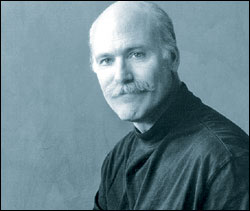STORIES ABOUT SCHOOLBOYS are usually about a kid’s neurosis (Salinger), a Mr. Chips equivalent (Dead Poets Society), or searing social tsuris (The Palace Thief, A Separate Peace). Tobias Wolff’s novel Old School (Knopf, $22) about a New England preppie in the JFK epoch contains all of the above, and his evocation of the milieu is sardonically knowing and sensitive, from the “Episcopalian English- envy” of the architecture to the joint graduation dances with the girls’ school, “said to be Neronic in their carnality, like the fabled last night of an ocean crossing.”
But School is essentially about what most such books ignore: the effect of books on the kids who read them. Wolff’s bildungsroman concerns the bildung itself, the way kids construct their own lives from the blueprints of books; how they model themselves both on their teachers and the illustrious writers they explicate.
At this boys’ school, lacking girls to fight over, students give themselves over to a cutthroat competition for literary prizes. The best short story wins the author an audience with a visiting author. First up: Robert Frost, who freaks out the winning student writer by mistaking his earnest homage, “First Frost,” as a vicious parody of his eminent self. Our narrator is impressed with Frost, but he becomes an instant, sneering convert to the next speaker, Ayn Rand: “Passing a shoe store, I saw a young salesman. . . . I [stared] at him, hoping he’d sense my rage and disgust. Youis this your dream? To grovel before strangers, to stuff their corns and bunions into Hush Puppies? And for whata roof overhead and three squares a day? Coward! Fool! Men were born to soar, and you have chosen to kneel!“
Yet a close encounter with Rand, then Hemingway, cures the objectivist kid. Rereading Papa, he discovers he’s all about terrible male vulnerability, not the two-fisted philosophy of manly sagas. Wolff wonderfully takes us inside the narrator’s developing heart. When he steps off the right path and willfully fucks up his life, it’s as emotionally comprehensible as (if less showy than) the act of arson that begins Endless Love. Wolff’s takedowns of visiting celebrity authors are pure literary ventriloquism: exhilarating, hilarious, and exactly what would have happened, he convinces you.
School isn’t a straight-up masterpiece, like Wolff’s memoir of growing up in Concrete, Wash., This Boy’s Life, but it sure has a kind of smaller mastery. When one august critic (Irving Howe or Alfred Kazin, I believe) suggested condescendingly that Wolff would never write another book as good as This Boy’s Life, he must have been horrified, vexed that for all his renown as a Stanford writing teacher, autobiographer, and short-story master, nobody ever called him a fine novelist. Well, now they’ll have to.
Tobias Wolff will appear at Third Place Books (17171 Bothell Way N.E., 206-366-3333), 7 p.m. Mon., Dec. 1.








